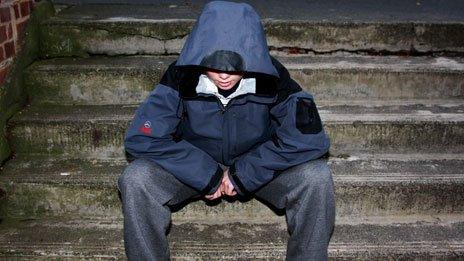Ofsted warns of 10,000 missing from school system
- Published

Ofsted is concerned that councils have lost track of pupils out of school
Ofsted is warning there are thousands of vulnerable youngsters in England who are missing from the education system.
These include youngsters who have been permanently excluded from schools, newly arrived migrants and children with mental health problems.
Ofsted chief Sir Michael Wilshaw said these youngsters were too often "invisible" to local authorities.
"This can be a safeguarding as well as an educational matter," said Sir Michael.
"If no-one in authority knows what education these children and young people receive each week, or whether they even attend, they not only miss out on education but can be vulnerable to abuse," he said.
Ofested Director for Schools Michael Cladingbowl: "It leaves these children more vulnerable"
"Everyone must take greater responsibility for knowing where they are."
'Not acceptable'
The education watchdog's report says that if the findings of inspections in 15 local authorities were replicated across the country, it would mean that 10,000 young people were missing from school.
Inspectors found that only five of the authorities kept adequate records of children who were not in full-time education.
Sir Michael said this gap in knowledge was "simply not acceptable".
Ofsted is calling for all schools and authorities to maintain a central record of children who are not in full-time lessons and to share information about the provisions being made for them.
The report says that all types of schools, including academies, free schools and independent schools, have a "responsibility to share information with the local authority about any child or young person who is out of school for 15 days or more".
The focus of concern in this report is not families who choose to home educate their children, but children whose education in school has been interrupted or has never properly begun.
Ofsted says this includes children who have been excluded from school and not found another place; children with special needs, including behaviour problems; children who have rarely attended school; children who have recently arrived in the country; children with physical or mental health problems and girls who have had a baby.
As well as youngsters who are missing out on school entirely, there are concerns about the quality of part-time lessons provided.
As an example, inspectors highlighted a girl who had been on track to get good exam grades, but when she left school to have a baby was only given part-time lessons in parenting skills.
The report also looked at where councils were successful in keeping young people on track with their education.
"This was not achieved by managerial box-ticking but by a moral purposefulness in everything they did," wrote Sir Michael, introducing the report.
"The individuals in these authorities ensured that no young person in their area slipped out of sight; they were also conscientious, and determined, in communicating with others, recognising that such responsibility does not recognise local authority boundaries."
Chris Keates, leader of the Nasuwt teachers' union, said that the government had "systematically undermined" the ability of local authorities to carry out their responsibilities.
She argued that the government's "structural reform has fragmented the school system and severed important links between schools and local authorities".
David Simmonds of the Local Government Association said: "One of the downsides of their reduced role in education is that councils are, too often, not in a direct position to intervene when concerns are raised about a child missing from education and have to jump through bureaucratic hoops to get those children back into the classroom."